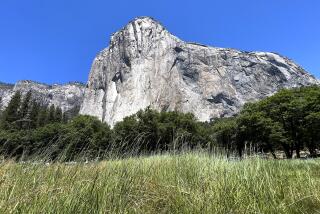House Rejects Effort to Shrink Park System
- Share via
WASHINGTON — Rebuffing some of the most zealous advocates of scaling back government, the House rejected a proposal Tuesday to begin shrinking what has long been one of the nation’s most sacred assets--its system of national parks and recreation areas.
The measure would have established a commission, similar to the military base closing panel, to recommend which National Park Service properties should be closed, turned over to state or local authorities, or given to private companies to operate. The purpose was to save money, supporters said.
The 54 largest national parks, including Yellowstone, Yosemite and Sequoia, would have been exempt from the process. But the list included the Statue of Liberty, the Washington Monument, the Santa Monica Mountains National Recreation Area and the Cape Cod National Seashore.
“This is a signal that the concept of park closing is dead,” said Rep. Bill Richardson (D-N.M.), who led the opposition. “The American people want to keep their parks. It could be that the environmental movement is reawakening.”
The Republican measure required a two-thirds majority for approval. It fell more than 100 votes short as 231 members, including 67 Republicans, voted no and 180 voted to approve. The legislation has not been considered by the Senate.
Although the vote was about whether to create a commission that would study the future of the national park properties, critics said that an even larger issue was at stake. “There is a lot of ideology being played out over whether we should have a park system and what is a park,” said Karl Gawell, director of national park programs at the Wilderness Society.
Twice in the last two months, the House has tackled sensitive environmental issues, and twice it has sent conflicting signals about the course it intends to take when it considers questions about preserving the environment, cutting the budget and helping the economy.
Tuesday’s vote came as part of the House campaign, led by its new Republican majority, to limit spending on environmental matters and to restrict the authority of the Environmental Protection Agency, the Interior Department and other federal offices charged with protecting the nation’s natural resources.
In coming weeks, the House and its committees are likely to be faced with additional questions over the future of exploration for oil and gas in Alaska, the Endangered Species Act and the Columbia River basin. Each will provide a test of how far Congress intends to shift away from environmental policies that have guided it since the early 1970s.
Lawmakers who favored shrinking the park system argued that by cutting government spending on smaller properties, the park service would have more money for its major attractions.
“The park glut and current federal budget constraints have combined to create a $1-billion to $2-billion backlog in land acquisitions, a $6-billion shortfall in construction and a $400-million to $800-million deficit in operations and maintenance funds,” Rep. Joel Hefley (R-Colo.), who sponsored the bill, wrote in a column in the Washington Post last January.
Critics warned that the bill threatened the future of the national park system. By handing the difficult decisions on the park facilities to a commission, opponents said, members of the House and Senate could insulate themselves politically from the difficult choices involved in closing popular national historic monuments.
Park Service Director Roger G. Kennedy has pointed out that the bill also offered no guarantee that money saved by closing some parks would be spent on the remaining sites.
Rather than shedding the federal responsibility for the sites, some have advocated closing the gap in the Park Service budget by increasing admission fees or raising the amount that private companies pay to the Park Service for restaurant and lodge concessions in the parks.
Hefley said that he plans to press the House Republican leadership to bring the measure back for a second vote--this time under a rule requiring a simple majority for passage. His spokeswoman, Leigh Lamora, blamed the defeat on “special interests” who “won a campaign of lies against us.”
Rep. James V. Hansen (R-Utah), chairman of the House Resources subcommittee on national parks, said that the measure was opposed “by the extreme environmental groups and those who carry their banner.”
In the debate Monday, opponents portrayed the measure as a “parks closing” bill. Its supporters insisted that nothing in the legislation would lead directly to the closing of any park, although the bipartisan commission would have been charged with assessing the future of the smaller and less-known Park Service properties.
More to Read
Sign up for Essential California
The most important California stories and recommendations in your inbox every morning.
You may occasionally receive promotional content from the Los Angeles Times.













